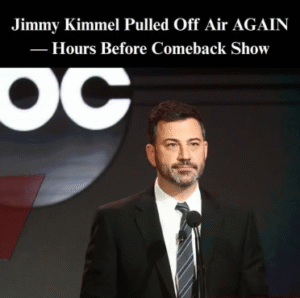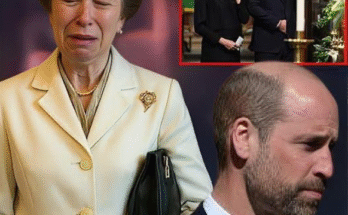🎭 The Flashpoint: Kimmel’s Controversial Monologue
The drama began with Jimmy Kimmel’s September 15 monologue, in which he addressed the tragic killing of conservative activist Charlie Kirk. Kimmel criticized what he described as the “MAGA gang” for politicizing the event and claimed the alleged killer, Tyler Robinson, was being framed as anything but one of their own. He also mocked former President Donald Trump’s response, which pivoted from the tragedy to touting a new White House ballroom.
These remarks sparked outrage among conservative circles, prompting backlash from major broadcast station owners, including Nexstar Media Group and Sinclair Broadcast Group.
📺 Nexstar’s Response: Preemption and Principles
Nexstar, which owns or operates 28 ABC affiliate stations, announced it would preempt Jimmy Kimmel Live! indefinitely. The company cited concerns over the “ill-timed and insensitive” nature of Kimmel’s comments and emphasized its commitment to “respectful, constructive dialogue” in the communities it serves.
In a public statement, Nexstar said:
“We made a decision last week to preempt Jimmy Kimmel Live! following what ABC referred to as Mr. Kimmel’s ‘ill-timed and insensitive’ comments at a critical time in our national discourse. We stand by that decision pending assurance that all parties are committed to fostering an environment of respectful, constructive dialogue in the markets we serve.”
This move effectively blocked Kimmel’s return in nearly 20% of the country, including major markets like Washington, D.C., Salt Lake City, and Nashville.
🛑 Sinclair Joins the Boycott
Sinclair Broadcast Group, which owns 38 ABC affiliates, followed suit. The company replaced Kimmel’s timeslot with local news programming and echoed Nexstar’s concerns about the tone and timing of Kimmel’s remarks.
Sinclair also reportedly demanded that Kimmel apologize to Kirk’s family and make a donation to Turning Point USA, the organization Kirk founded.
🏛️ FCC Pressure and Political Undertones
The controversy escalated when FCC Chair Brendan Carr weighed in, suggesting that ABC affiliates could risk losing their broadcast licenses over Kimmel’s comments. This added a regulatory dimension to what was already a politically charged situation.
Kimmel’s suspension by ABC, which lasted nearly a week, was reportedly influenced by pressure from both Nexstar and Sinclair, as well as internal discussions at Disney, ABC’s parent company.
🎙️ Kimmel’s Return: Defiant Yet Reflective
When Jimmy Kimmel Live! returned on September 23, Kimmel addressed the controversy head-on. He expressed regret for any perceived insensitivity but stood by his critique of political opportunism:
“It was never my intention to make light of the murder of a young man. I don’t think there’s anything funny about it.”
He also took aim at Trump, who had celebrated Kimmel’s suspension and called for other late-night hosts to be canceled:
“You almost have to feel sorry for him. He tried his best to cancel me. Instead, he forced millions of people to watch the show. That backfired bigly.”
Kimmel added that Trump’s reaction was emblematic of a leader who “celebrates Americans losing their livelihoods because he can’t take a joke”.
📡 The Impact: Ratings, Revenue, and Reach
With Nexstar and Sinclair refusing to air the show, Jimmy Kimmel Live! is now unavailable on 66 ABC affiliate stations across the U.S. This has serious implications:
- Ratings Decline: Linear TV ratings are crucial for advertising revenue. Losing access to nearly 25% of U.S. households could tank viewership metrics.
- Sponsor Pullout: Advertisers may hesitate to invest in a show with diminished reach.
- Streaming Shift: Disney is promoting the show on Hulu and other platforms, but streaming doesn’t fully compensate for lost broadcast exposure.
Some analysts speculate that if the boycott continues, ABC might consider canceling the show when Kimmel’s contract expires in May 2026.
🧠 Media Ethics: Free Speech vs. Community Standards
This situation raises thorny questions about media ethics:
- Should station owners have the power to block network programming based on political content?
- Is Kimmel’s satire protected speech, or did it cross a line into harmful rhetoric?
- Are broadcasters prioritizing community values or engaging in censorship?
The American Civil Liberties Union (ACLU) weighed in, with hundreds of celebrities signing a letter defending Kimmel’s right to free expression.
🧭 Disney’s Balancing Act
Disney, caught between its star talent and its affiliate partners, has tried to walk a fine line. After suspending Kimmel, the company held “thoughtful conversations” with him before reinstating the show. Disney emphasized its desire to avoid “further inflaming a tense situation”.
However, the company’s decision to bring Kimmel back without securing buy-in from Nexstar and Sinclair has left the show in limbo in many markets.
🧩 What’s Next?
Nexstar has stated that it is “engaged in productive discussions” with Disney, leaving the door open for a possible resolution. But until then, viewers in affected markets will have to rely on streaming platforms to watch Jimmy Kimmel Live!.
Meanwhile, the broader debate over media control, political influence, and free speech continues to simmer.
📝 Final Thoughts
The refusal by Nexstar and Sinclair to air Jimmy Kimmel Live! underscores the complex interplay between entertainment, politics, and corporate power. What began as a controversial monologue has evolved into a national conversation about censorship, accountability, and the role of broadcasters in shaping public discourse.
Whether this standoff ends in reconciliation or cancellation, it’s a defining moment for late-night television—and a reminder that even comedy isn’t immune from America’s culture wars.


